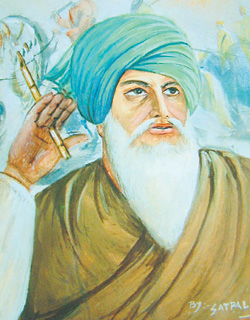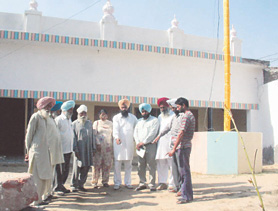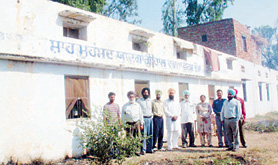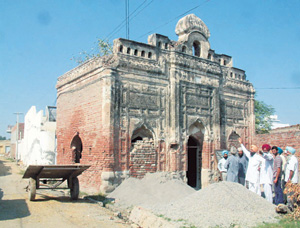drkhalsa
SPNer
- Sep 16, 2004
- 1,308
- 54
Retracing the glory of Shah Mohammad
Tribune News Service
Tribune News Service

It took more than a century to establish that Shah Mohammad, who wrote “Jangnama”— a colossal work that gave an eyewitness account of the first Anglo-Sikh War that took place after the death of Maharaja Ranjit Singh, actually belonged to the border village Wadala Veeram in Amritsar district and not Batala, a steel town in Gurdaspur district.
The poetry of Shah Mohammad is part of Punjab’s golden heritage and is considered a lighthouse for the generations to come.
It was Maula Baksh Kushta, a famous Punjabi critic, who also hailed from Wadala Veeram, to first to point out that Shah Mohammad belonged to his own village.
The second International Shah Mohammad Memorial Festival has been dedicated to Sardar Dyal Singh Majithia, founder of
The Tribune. Majitha, the ancestral village of Sardar Majithia is only 6 km from Wadala Veeram.
The famous Pakistani poet and General Secretary of the World Punjabi Conference, Mr Kanwal Mushtak, said his organisation would evolve a plan to organise joint functions in India and Pakistan in the name of Punjabi poets. The festival, in the name of Shah Mohammad, would be held in Pakistan in the near future, he said. Similarly, a function in the name of Hasham, the Muslim Punjabi poet (who also belonged to Amritsar) was also being planned, he added.The Tribune. Majitha, the ancestral village of Sardar Majithia is only 6 km from Wadala Veeram.
Kushta wrote that the poet was born in 1780 and died in 1862, a few years after the death of Maharaja Ranjit Singh. The world famous “Jangnama,” he said, might have been written around 1846.
Aghast at palace conspiracies and intrigues following the death of Maharaja Ranjit Singh, the classic poet accurately presented the reasons for the demise of the Sikh rule.
An ardent admirer of Maharaja Ranjit Singh’s rule, Shah Mohammad believed that the king had converted Punjab– the land of five rivers— from the “an abode of sorrow to a garden of paradise.”
The poet had rued that soon after Maharaja Ranjit Singh’s death, the entire edifice of his kingdom collapsed due to internal intrigues and British machinations.
After two abortive Anglo-Sikh Wars, Punjab was finally annexed to the East India Company in 1849. Dr Harbhajan Singh Bhatia, a professor at the School of Punjabi Studies, describes Shah Mohammad as a great patriot who infuses a sense of nationalism among the readers.

Members of the Trust point out the place where a well belonging to the poet’s house was filled up.

A school hall , named after the poet, at Wadala Veeram village near Amritsar.
Showering praise over the composite Punjabi culture during the reign of Maharaja Ranjit Singh, where Hindus, Sikhs and Muslims lived happily with each other, the poet had written that Punjab was fortunate in having developed and cherished since centuries a long and glorious tradition of such culture.
The mystic songs of Sufi-saints and Punjabi poets in particular were the pride of the whole of Punjab, he had further written. During this reign, all communities reaffirmed their Punjabi roots, he had mentioned.
For him, Punjabi Muslims became a part and parcel of Sarkar-e-Khalsa who had earlier looked towards Afghans and Pathans and were consequently betrayed by them.
Shah Mohammad wrote that the Maharaja’s legacy was such that he had created a secular kingdom that was equal to all.
The poet in him could project, in most appropriate words, the infighting of the Sikh Sardars and the treachery perpetrated by the Dogras led by Dhyan Singh Dogra, making the descriptions a “primary source” for all historians.
Dr Bhatia says the historical facts given in “Jangnama” are verifiable from the “Roznamacha” (a daily diary) written during the reign Maharaja Ranjit Singh.

An old mosque in the ancestral village of poet
Shah Mohammad.The four majestic mosques are a testimony to the fact that the village was Muslim-dominated before the Partition. Historians have pointed out that close relatives of Shah Mohammad were employed in Maharaja Ranjit Singh’s army.
It was with their help that the poet could piece together a complete picture of the battle between the Sikhs and the British.
Dhyan Singh Dogra, who originally belonged to Jammu, rose to the rank of Prime Minister of Maharaja Ranjit Singh’s kingdom.
The other group was led by the noblemen of Lahore, who were both Muslims and Hindus and had important portfolios like foreign affairs, medicine and science.
The secular rule of Maharaja Ranjit Singh worked well during his lifetime, but with Kharak Singh, his eldest son, becoming the king, things started to change.
The new Maharaja turned out to be full of vices and lacked the ability to rule. Hence it was high time for Sikh Sardars and Dogras to indulge in conspiracies. Historians attribute the inability of Sikh leaders and the intrigue started by the Dogra brothers responsible for the fall of the kingdom.
Even as fests were being organised in the memory of modern poets, no major effort had been made to mark the contributions of Shah Mohammad.
Then, a couple of years ago, Mr Manjit Singh Bhoma and Mr Bhupinder Singh Sandhu, both residents of the area, formed the Shah Mohammad Memorial Trust to preserve the heritage of the legendry poet.
However, traces of history linking the village to the poet are being slowly obliterated.
A gurdwara and a private residence has come up at the site where the poet once lived.
Wadala Veeram was a Muslim-dominated village which witnessed communal frenzy as the country inched towards Partition, claiming many Sikh and Muslim lives.
Earlier, historians took more than a century to confirm that the actual village of Shah Mohammad was Wadala (the last village of Amritsar) and not Batala (Gurdaspur).
A team of researchers in 1973, led by the then Director of the Punjabi Languages Department, visited this village and with the help of revenue records, discovered an old marble slab fixed on the well of Shah Mohammad’s house.
After holding two commemorative functions, first in 1973 and then in 1978, Shah Mohammad forgotten again by the villagers, the Languages Department and the state government.
Now Shah Mohammad Yadgari Charitable Trust has decided to retrace the life of the legendary poet with the help of Almi Punjabi Virasat Foundation.
Both the organisations will hold a festival in the name of Shah Mohammad on December 8 at Wadala Veeram.
Mr Jagir Singh, a retired Sub-Inspector, who witnessed the communal riots in the village, said all its Muslim residents migrated to Pakistan after the carnage. The villagers, especially the family of Late Niranjan Singh Chabba, have made efforts to preserve an ancient mosque in the village. Though two mosques are in a dilapidated condition, one of these— Baba Taran Shah— situated on the main road, is being maintained by a Sikh family.

